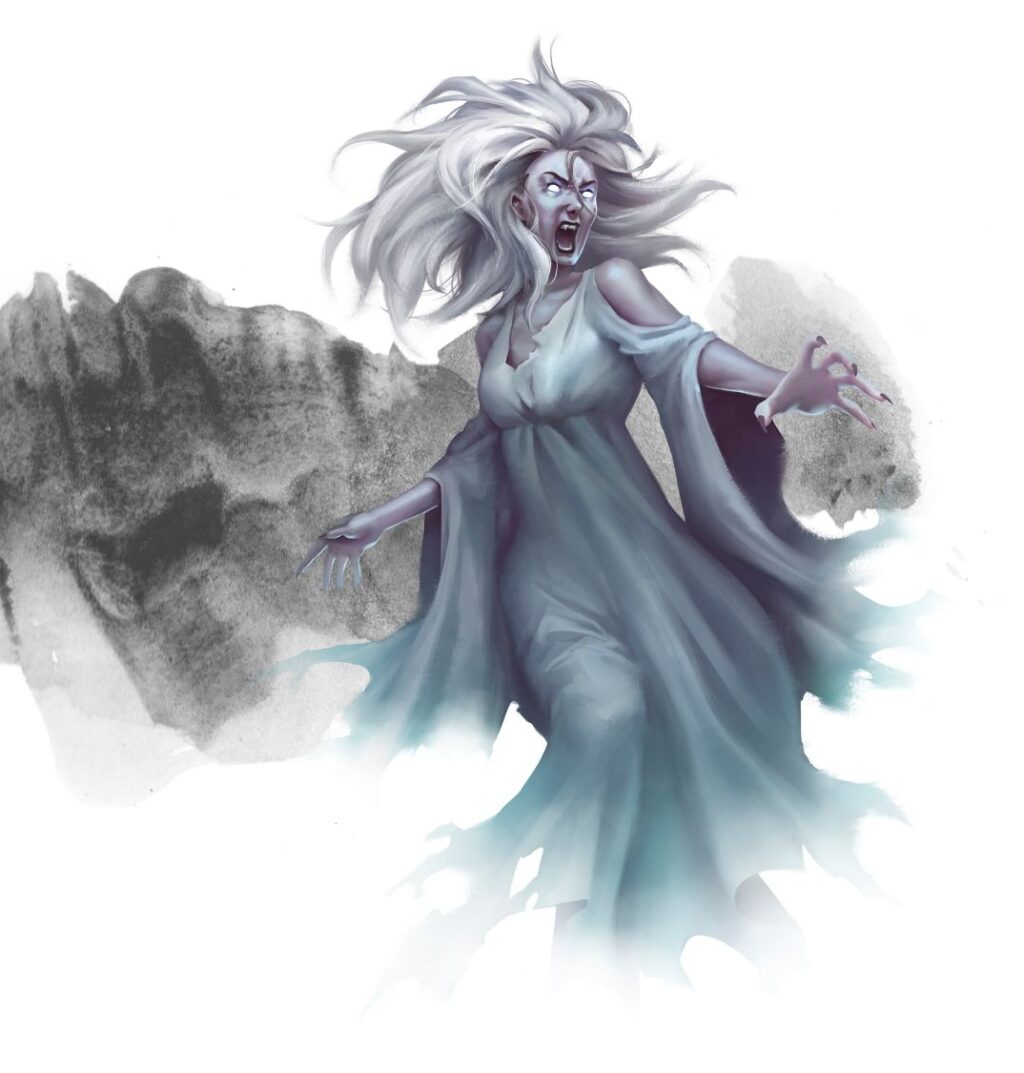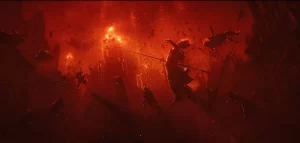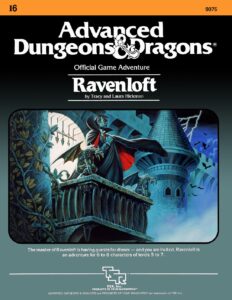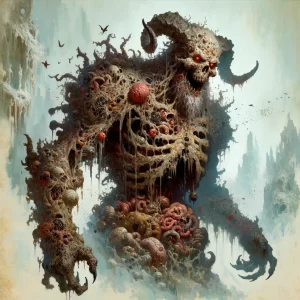
The Revenant
Revenants are nightmarish harbingers of retribution, forsaking eternal peace in the afterlife to seek dark justice against those who wronged them in life. With only a year to exact their chilling vengeance, the stakes are as high as they are ominous: success will grant them passage to the afterlife, while failure leads to an abyss of eternal oblivion.
Though they may bear a superficial resemblance to zombies, no observer, even a casual one, could possibly mistake the two abominations. Zombies stumble with aimless hunger, while the stride of a revenant is purposeful, imbued with a dreadful sense of mission. When you lock eyes with one, you're met with an intense gaze of malevolent determination, leaving no room for doubt: this creature is hell-bent on fulfilling its dark quest.
Initially, the revenant's spirit occupies its original, albeit decayed, flesh. Should its physical form be destroyed, however, its dark soul has the terrifying ability to seek out and inhabit a new corpse. Time is of the essence; the spirit must find a new vessel swiftly, or be lost to the void forever.
Whether in its original body or a borrowed one, the revenant's chilling gaze is a haunting beacon of its eternal grudge. Most unnerving of all, its intended victim will always, without fail, recognize the soul seething behind those malevolent eyes. A glance from a revenant is like a curse; it's a message that they've been marked for a reckoning beyond imagination.
Of Revenant
Moreover, revenants are disturbingly resilient, their fortitude an unholy blend of magical restoration and dark willpower. Such is their supernatural endurance that they can dismiss trivial injuries as if they were mere annoyances. Even when occupying an older, decaying body, they have the horrifying ability to partially reverse the ravages of time and decomposition. While this regenerative power may not restore them to a lifelike appearance, it reinforces their already formidable durability, making them even more fearsome adversaries on their relentless path to vengeance.
Revenants are dark manifestations of rage and retribution, spawned from deceit and nourished by vengeance. In contrast to the wandering spirits and ghosts who might have numerous unresolved matters or the calculating wights with their self-serving schemes, a revenant is driven by a singular, chilling objective: the utter annihilation of those who wrongfully caused its demise. This undying resolve is both their strength and their curse; there is no compromise, no alternative path.
If their corporeal form is laid to waste, their vengeful spirit simply relocates to another vessel, a grim testament to their indomitable will. And let not their prey think that distance or hiding will grant them safety; the revenant possesses an eerie, innate ability to sense their location, no matter how far or well-hidden. They are bound to their victims in a horrific dance of impending doom, ceaseless until their thirst for revenge is quenched.
These are not mere shambling corpses; revenants possess an unsettling intellect, setting them apart from other creatures of the undead realm. While divine intervention may hold sway over zombies and ghouls, it hardly fazes a revenant. Their reanimation isn't the work of gods or dark sorcery, but rather a cosmic act of balance and justice-a force that even deities must acknowledge. Some element of personal choice exists in their grim resurrection, similar to how a wight might be created. Yet, not every betrayed soul becomes a revenant; some ineffable criteria must be met.
It's Existence
The life-or rather, the unlife-of a revenant is a desperate existence, defined by an all-consuming purpose tinged with impending doom. While they relentlessly pursue their goal of vengeance, they are haunted by the dire consequences of failure: not a peaceful afterlife or a reunion with loved ones, but an unfathomable obliteration of their very soul by cosmic forces that transcend even divine powers.
And yet, sometimes even this merciless process can go horribly wrong. Should a revenant be so close to completing its mission of revenge, only for it to be snatched away at the last moment, the resulting cosmic disruption may twist what remains of their bitter spirit into a wraith-a creature of even darker implications. The likelihood of this grim transformation depends on both the nature of the revenant and the particular circumstances of their failure, adding yet another layer of terror to their already nightmarish existence.
Should the object of a revenant's wrath perish without the revenant's involvement, most will find some solace and willingly move on to whatever awaits them in the afterlife, or fixate on a new quarry. However, there exists a subset of revenants-those who had deeply personal relationships with their betrayers or were driven by an insidious form of self-interest. For these relentless souls, the mere death of their target is insufficient; they must be the instrument of that demise, the one who delivers the final, fatal stroke.
Failure to do so can unleash an inferno of existential anger within these revenants, powerful enough to rupture their cosmic covenant and redirect their wrath indiscriminately upon the living. Resembling wights in their newfound vendetta, these aberrant revenants may even commence their reign of terror by hunting down and exterminating the very individuals who were responsible for killing their original target. It's as if they've been transformed into something even darker, fueled not just by vengeance but by a malevolence that threatens to consume all that crosses their path.
Vengeful Quests
Revenants are restless entities, their whereabouts dictated more by the haunting pull of their vengeful quests rather than any personal inclination. Void of the need for nourishment or even the simple act of breathing, it is the singular, monomaniacal focus on retribution that fuels their existence. Generally, these avatars of vengeance will pursue the most straightforward path to their prey, yet their intelligence allows for tactical deviations. For instance, they steer clear of populated areas-not out of fear but rather for sheer practicality. Thriving communities become intricate mazes of human interaction, distractions that slow their relentless march toward justice.
Moreover, the devout among humans are often less than welcoming to such clearly undead creatures, even if these revenants are animated by forces beyond the reach of mere mortal religiosity. Although endowed with incredible regenerative capacities and a remarkable resilience to the traditional methods of destroying the undead, engagements with zealous worshipers are considered trifling detours on their road to retribution. Their avoidance of such distractions isn't a sign of weakness, but rather an indication of their unwavering, obsessive commitment to their ultimate objective: a merciless, final reckoning with those who wronged them.
Revenants are neither unthinking nor irrational; they are complex entities, operating under a single, powerful motive-vengeance. Yet within the cold, grim confines of this singular objective, a sliver of their former humanity endures. They might form alliances, temporary though they may be, with old friends or new acquaintances driven by a similar moral compass. Still, the revenants are frigid echoes of their former selves, regarding past affections and interests as ephemeral compared to the colossal weight of their quest for justice. Their mind is a never-ending loop of awareness, constantly alert to their target's whereabouts, a haunting refrain that drowns out all other thoughts or distractions.
Conversations with a revenant can be brief but purposeful, particularly if one can provide information that advances their mission. They may tolerate-perhaps even welcome-company, as long as it doesn't delay their relentless pursuit. When faced with a choice between their quest and the welfare of allies, the revenant unflinchingly prioritizes the former. As creatures who have already brushed against the cold grip of death and emerged on the other side, revenants exhibit remarkable composure in combat, avoiding senseless violence unless it propels their vendetta forward.
Some may even issue warnings, a curt suggestion for potential aggressors to reconsider their actions. Their capacity for resistance to physical harm is uncanny, and their fearlessness in battle is enhanced by the knowledge that even if they fall, their vengeful spirit can seize another vessel. All these elements combine to make them formidable, almost mythic figures, embodying a dark, relentless pursuit of justice that borders on the obsessive.
The manner in which a revenant seeks to kill their target depends greatly on their relationship and the magnitude of their betrayal, as well as the revenant's personality in life. A more pragmatic revenant might be happy to simply kill the target in their sleep, satisfied enough that the deed was done.
Others, of a more honor bound or emotional bent, might deeply feel the need for their target to know it was they who sent them to their doom, for their face to be the last thing the target sees. Those who lived a life of violence, or whose deaths were particularly traumatic, might not be satisfied unless the target's death is some parallel of their own, such as burning down the house of one who burnt them at the stake, or ensuring the family of the target witness their killing, if the same was true for the revenant.
Emotional
The method a revenant employs to exact revenge is intrinsically tied to the complex web of emotions, relationships, and betrayals that formed the tapestry of their past life. Practical-minded revenants may opt for expedience, silently dispatching their target in slumber and finding satisfaction in the mere completion of their vengeful mission. However, for those with an honor-bound ethos or those driven by raw emotion, the act of revenge becomes a deeply personal theater. They crave the moment of recognition in their victim's eyes, yearning for their own visage to be the last thing the betrayer ever witnesses-a final, haunting tableau imprinted upon the dying mind.
For revenants who lived lives steeped in violence or whose ends were marked by extraordinary suffering, mere death may not suffice as just retribution. They may seek poetic justice, a mirrored echo of their own demise. A revenant who was burned at the stake might find satisfaction only in reducing their perpetrator's dwelling to ashes. Similarly, if a revenant's death was a public spectacle, witnessed by loved ones or family, they may insist that the betrayer's end be carried out under the watchful eyes of their own kin. In these ways, the revenant doesn't just seek revenge; they seek a twisted form of karmic balance, an eye for an eye, a soul for a soul.
Maybe interested in Shadows for 1 Elite Smuggler






